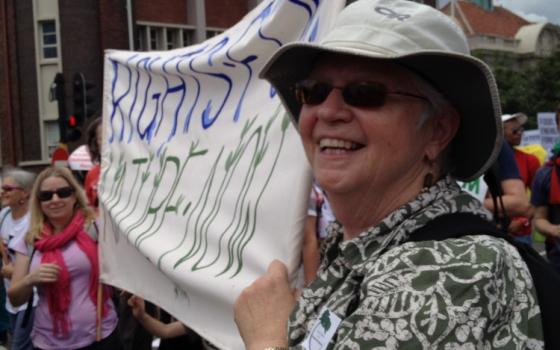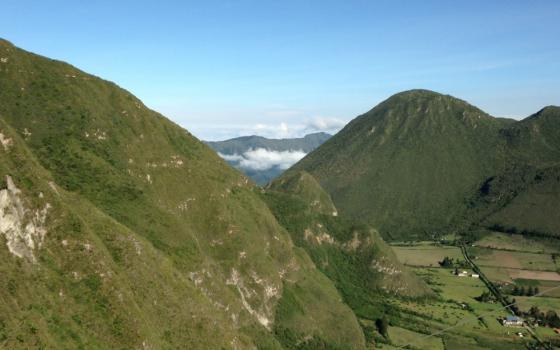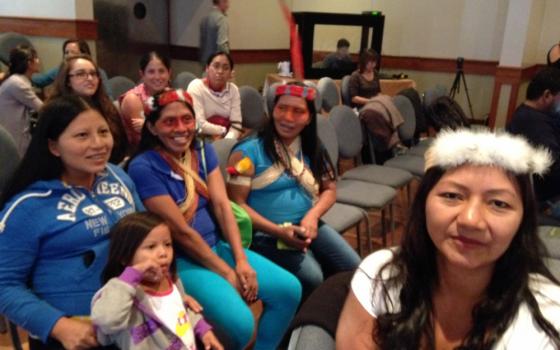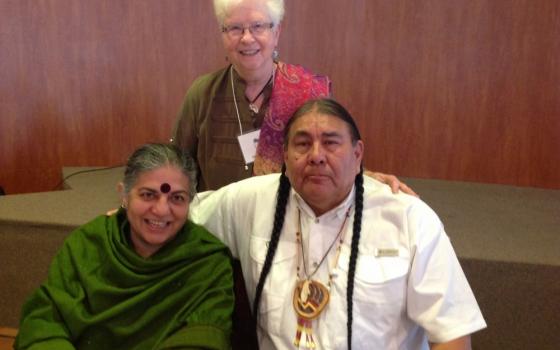“It’s all a question of story,” wrote Thomas Berry. “We are in trouble now because we do not have a good story .. . . and the old story, the account of how we fit into it, is no longer effective. We have not yet learned the new story.”
Pope Francis's long-awaited encyclical on the environment, Laudato Si’ tells a story and issues a call to all people to act on behalf of our common home. It offers much more than a treatise on the environment and climate change; it sets a cosmological context of belonging to creation as relatives, as brothers and sisters (11). It calls for an ecological spirituality and conversion (216), and offers a moral framework for both individual and collective response to care for our common home.
As an Earth lawyer and Catholic sister striving to awaken people to the peril of Earth's desecration and the promise of acting as a single community of life, I hear Francis's story with gratitude and relief.
Francis weaves a story of integral ecology (137).
". . . [W]e have to realize that a true ecological approach always becomes a social approach; it must integrate the questions of justice in debates on the environment, so as to hear both the cry of the earth and the cry of the poor" (49).
He emphasizes the interrelationship between environmental destruction, anthropocentric domination of nature, disregard for people who are poor and vulnerable among us, extinction of species and the plunder of an unrestrained global economic system. Pollution and climate change, depletion of fresh water, biodiversity loss and disregard for human communities are the consequence "of short-sighted approaches to the economy, commerce and production" (32).
Francis connects the value of human life with the value of the Earth community which sustains all life. "It is not enough . . . to think of different species merely as potential ‘resources’ to be exploited, while overlooking the fact that they have value in themselves" (33).
While sliding over the consequences of overpopulation (50), Francis boldly identifies the interrelated, causal dynamics that are destroying the fabric of our common home.
I was engaged, surprised, grateful and often in tears as I read Francis's epic story. It was encouraging to discover how closely it aligns with the sacred story that guides me and the work of Earth jurisprudence that is rooted in kinship.
A call to right relationship
Francis tells the story in ordinary language. He sets a familial tone of belonging throughout the encyclical with his use of kinship language: “Sister” Mother Earth, or Brother Sun, Sister Water, or Brother Wind. He invites the reader to self-reflection and to listen to the voices of Earth and persons who are poor as they speak to us.
Like Francis of Assisi, Pope Francis calls us into right relationship with all beings who share our common home and to defend those among us who suffer the most.
While not explicitly endorsing his Jesuit brother Teilhard de Chardin, who taught a cosmology of an interrelated, co-evolutionary Universe that is Christic-oriented, Francis reveals an affinity without specifically endorsing the co-evolutionary nature of the Universe. He writes, "The ultimate destiny of the universe is in the fullness of God, which has already been attained by the risen Christ, the measure of the maturity of all things" (83). He expands on this in paragraph 233: "The universe unfolds in God, who fills it completely. Hence, there is a mystical meaning to be found in a leaf, in a mountain trail, in a dewdrop, in a poor person's face. The ideal . . . is to discover God in all things." Thus Francis positions humanity as having "unique worth and . . . tremendous responsibility" (90), while also recognizing the inherent worth of other aspects of creation as well.
The end of a theology of domination
Francis calls for a new story of human relatedness with creation, and specific rejection of human domination over. “. . . [N]owadays we must forcefully reject the notion that our being created in God’s image and given dominion over earth justifies absolute domination over other creatures” (67).
Francis’ explicit rejection of a theology of dominion over the Earth is a needed correction. Humanity will never take the necessary action to counter and reduce the impacts of climate change and environmental destruction if we continue to subscribe to a human exceptionalism that legitimates our ongoing domination of nature.
Laying the groundwork for new legal systems that require shared responsibility
In my years as an Earth lawyer, there has been a silence in church teaching regarding the linkages between, and co-violations of, environmental and human rights. So it is particularly gratifying to have Francis issue a clarion call throughout Laudato Si' that positions the church as a strong ally of both environmental and human justice.
The encyclical recognizes the need for new legal frameworks which are "indispensable" in setting "clear boundaries [that] ensure the protection of ecosystems" (53). This is a breakthrough moment for people who are working to advance legal recognition of nature's rights to exist and flourish.
Francis's call for people to listen to the laws of nature legitimizes the germinal efforts of organizations that strive to design and implement laws and policies that respect the inherent value of nature – for example: the Center for Earth Jurisprudence. the Earth Law Center, the Community Environmental Legal Defense Fund, the Indigenous Environmental Network, the Women's Earth and Climate Action Network Navdanya, and Global Alliance for the Rights of Nature.
These organizations are joining with international indigenous organizations and other European-based "eradicating ecocide" initiatives in preparing for the third World Peoples' Tribunal on the Rights of Mother Earth taking place in Paris during the U.N. climate negotiations in December. Our intent is to speak with one voice on the need for laws that respect the rights of Mother Earth. In alignment with the encyclical, and with the two previous Tribunals, there will be stories and evidence presented to a panel of renowned citizen judges of co-violations of environmental and human rights. People most affected by climate change and excessive environmental extractive practices will be the expert witnesses testifying to this peoples' tribunal exercising moral jurisdiction.
We adopt this Peoples' Tribunal, since the U.N. and international community remain derelict in implementing structures and mechanisms to reduce greenhouse gas emissions and its consequences.
Mechanisms leading to climate justice
Although a key purpose and timing of Laudato Si' is to influence the outcome of the upcoming climate negotiations in Paris in December, Francis does not endorse or promote any specific climate justice solutions. He does, however, reject "cap and trade" mechanisms (171). These market mechanisms expand increased economic commodification and objectification of nature; i.e., the atmosphere. Treating the atmosphere as a trade commodity, and then allocating to the market the right to sell the levels of air pollution, is a false economically-driven "solution" that is not consistent with an integral ecology. Rather, it exacerbates the problem.
Francis invites consideration of other solutions for reducing greenhouse gas emissions. He insists that wealthy, industrialized nations owe an ecological and social debt to other countries, as a result of disproportionate consumption of Earth's minerals and natural resources. He speaks of common, but "differentiated responsibilities” for social and environmental justice (52).This term, which is often used in global climate discussions, means that all nations, industrialized and developing ones together, share a common responsibility for reducing carbon emissions. However, not every nation has contributed the same degree to climate change; therefore, there are historical responsibilities that need to be "differentiated.”
Clearly the developed countries have contributed more greenhouse gas emissions than the developing nations. Many of the developing countries argue they are owed technological and financial resources from the industrialized nations to help them adapt to the impacts of climate change. They also need assistance in mitigating greenhouse gas emissions. They have contributed the least to environmental devastation and carbon emissions, yet they suffer the most.
In addition, these "undeveloped" countries often have an abundance of natural resources that industrialized countries are grabbing quickly. This often lays the foundation for violence between mining and extractive industries and local residents. The resistance is often led by indigenous peoples who want to preserve their land and lifestyle from destructive mining practices.
For example, in Ecuador, there was a campaign started in 2007 to protect the Yasuni Amazon National Park from mining and oil extraction. The Shuar people have led the resistance campaign to keep "the oil in the soil." President Rafael Vicente Correa Delgado led a Yasuni-ITT Initiative for several years to keep this area protected from mining. He asked for contributions from industrialized societies to keep the oil in the ground rather than extract it and add to increased carbon emissions. After six years, over extensive protest of Ecuadorian citizens, Correa ended this initiative. However, the leaders of indigenous communities continue their resistance.
Last November, José Isidro Tendetza Antún, a former vice-president of the Shuar Federation of Zamora, was found murdered. He was last seen on his way to the U.N. Conference on Climate in Lima, Peru, where he was invited to testify at the climate talks about the Mirador copper and gold mine and the continued aggression of international mining companies that were destroying the land and cultures of indigenous people living there.
The killing highlights the violence and harassment facing environmental activists in
Ecuador and elsewhere. A United Kingdom group, Global Witness, reported in April, 2015 that "at least 116 environmental activists died in 2014 while campaigning against mining, logging, water and land grabs."
It is important to note that many of the industrial initiatives are legal: They have signed contracts with trade representatives of developing countries to extract resources in exchange for financial contributions to the country's economy. These contributions, however, rarely extend to the members of the natural community, indigenous and ecological alike that have been devastated by the mining – and they do nothing to protect the integrity of the land or people. Consistently we see that the rapacious greed of an unrestrained global market does not balance the rights of people and the environment in their drive for constant economic growth.
Challenges and possibilities
Significant challenges exist to the adoption and ratification of a climate framework that all nations can agree to. Francis recognizes that "[e]nforceable international agreements are urgently needed, since local authorities are incapable of effective intervention” (173).
One of the greatest barriers to a global climate treaty is the lack of international enforcement mechanisms that can hold nations accountable to achieving annual emissions reduction targets. The complexities of enforcing such a global mechanism seem daunting. Yet, as Naomi Klein (who recently was invited to the Vatican to consult with Cardinal Turkson on Laudato Si’) illustrates in her book, This Changes Everything: Capitalism vs. the Climate, there already exists at least one model (albeit without transparency or impacted parties' participation) for enforcing global regulatory agreements: the World Trade Organization (WTO).
The WTO has a set of rules that all signers agree to follow, sometimes with draconian results. These rules enable parties to challenge alleged "unfair and protectionist trade practices." Frequently, challenges have applied to measures taken by countries to specifically reduce greenhouse gas emissions. For example, in 2009 Ontario, Canada, pledged to wean its province completely off coal by 2014 (Klein, 67). It adopted legislation which incentivized renewable energy providers by allowing them to sell power back to the grid. The legislation also provided incentives for local municipalities, co-ops and indigenous communities to enter the renewable energy market. In order to qualify, solar energy developers had to obtain at least 40 percent to 60 percent of their production material from within the province. There were also "buy local" and "hire local" provisions that added more than 31,000 jobs by 2014.
It seemed to be an incredible success story. Soon, however, Japan and the European Union submitted a complaint to the World Trade Organization alleging that Ontario's "local-content requirement" was in violation of WTO rules. They specifically argued "that the requirement that a fixed percentage of renewable energy equipment be made in Ontario would 'discriminate against equipment for renewable energy generation facilities produced outside of Ontario'" (Klein 68). The WTO decided against Canada, ruling that Ontario's requirement to "buy-local" was protectionist and violated the free trade agreement. The manufacturing plant was closed down, and workers were again unemployed. The Ontario government did not appeal. Thus trade trumped climate. But the enforcement mechanism "worked.”
I cite this to illustrate two points. First is to demonstrate the economic prowess of global multinational behemoths that have designed international trade agreements such as the WTO Agreements, North American Free Trade Agreement (NAFTA), and the emergent Trans-Pacific Partnership Agreement (TPP). They can effectively counter local climate change remedies. Secondly, and even more importantly, is to illustrate that if international trade representatives can design global mechanisms that enforce alleged trade violations across international borders, why can't similar mechanisms be adopted to enforce violations of carbon emission commitments? It is already being done in the name of free trade.
As Francis notes, workable solutions "must be respectful of each nation's sovereignty" and they must "also lay down mutually agreed means of averting regional disasters which would eventually affect everyone" (173). Lasting solutions become a matter of respect, political will and commitment to the common good.
Making an impact
Laudato Si' stirs hope and promise for many, fear and trepidation for others. At the press conference immediately following the release of Laudato Si’, Cardinal Peter Turkson, President of the Pontifical Council for Justice and Peace in Vatican City, referred to the upcoming U.N. climate negotiations taking place in Paris in December and said, “Humanity is face to face with a crucial challenge that requires the development of adequate policies, which, moreover, are currently being discussed on the global agenda. Certainly, Laudato Si’ can and must have an impact on important and urgent decisions to be made in this area.”
Recognizing that we need a new story that has mythic and spiritual power to awaken us as a species to the "soul-sized" crises facing us, Francis asks each of us, “What kind of world do you want to leave to those who come after us. . . ” (160)? He boldly has set before us a vision of what it means to be human in the 21st century. He offers interconnected criteria for building an integral ecology and a moral compass for defending our common home.
What will be our response ? What will be the response of the global community meeting in Paris in December? Will the United Nations be receptive to Pope Francis's message when he addresses the General Assembly in September? Will the U.S. Congress? How about the people in the pews?
Finally, what story will we tell ourselves and our children when we look back at this pivotal moment in history? In the words of Terry Tempest Williams in Refuge: An Unnatural History of Family and Place, “The eyes of the future are looking back at us and they are praying for us to see beyond our own time. They are kneeling with hands clasped that we might act with restraint; that we might leave room for the life that is destined to come."
[Patricia Siemen, OP, JD, is a Dominican Sister from Adrian, Michigan, and a civil attorney who works to protect the long-term ecological and spiritual health of humans and all members of the Earth community. She is director of the Center for Earth Jurisprudence at Barry University School of Law, Orlando, Florida.]






